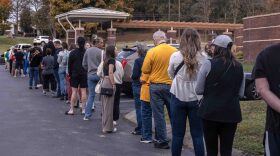A Nashville judge has restored the voting rights of four people in Davidson County, dissenting from a contentious state requirement that imposed greater restrictions on formerly incarcerated Tennesseans.
The Tennessee State Election Commission had required people with prior felony convictions to restore their gun ownership rights before their voting rights. Since many felony charges bar people from owning a gun, the rule disqualified people who would’ve otherwise been eligible to vote again.
Both the state and the petitioners cited State v. Jackson, a Tennessee State Supreme Court case which determined a person may regain full citizenship rights without regaining the right to own a firearm. In her ruling, Nashville Criminal Court Judge Angelita Dalton found that while the petitioners may not be able to regain their rights to own a gun, they should have their full citizenship rights restored.
“This Court finds that (the petitioner’s) permanent prohibition on possessing firearms does not render her ineligible from having her full rights of citizenship restored,” one of the four orders said. “While the Court acknowledges that Tenn. Code Ann. § 39-17-1307(b)(1)(B) requires that the lifetime firearms prohibition remain in place, the Court also understands that the Tennessee Supreme Court’s holding in State v. Johnson does not require that (the petitioner’s) gun rights be restored before she may have her full rights of citizenship restored.”
Attorney Keeda Haynes with the non-profit Free Hearts represented the petitioners.
“We are up against a deadline, and we’re talking about a convoluted, time-consuming process. But, moving forward, we will be able to get people registered to vote,” Haynes said.
While more people may now be eligible to restore their voting rights, they may not be able to do it by the Oct. 7 deadline. Tennessee has other unique hurdles to re-enfranchisement, being the only state in the country that requires potential voters to be up to date on their child support payments.
“Anybody that has to have their voting rights restored should have been thinking about the voter registration deadline six months ago,” Haynes said.
Haynes called the order a win, but said her client’s ability to vote still depends on the approval of the state election commission.
“The elections division have said … that if the order has any type of exclusion, then they will deny the person,” Haynes said. “So, you know, we just don’t know what they will do with this order.”
If her clients are denied, Haynes said she will take the state back to court.
The state election commission referred WPLN News to the Tennessee Attorney General’s Office, citing ongoing litigation. The Attorney General’s Office has not yet responded to a request for comment.
Update: This story has been updated to reflect a statement from the Tennessee State Election Commission.





